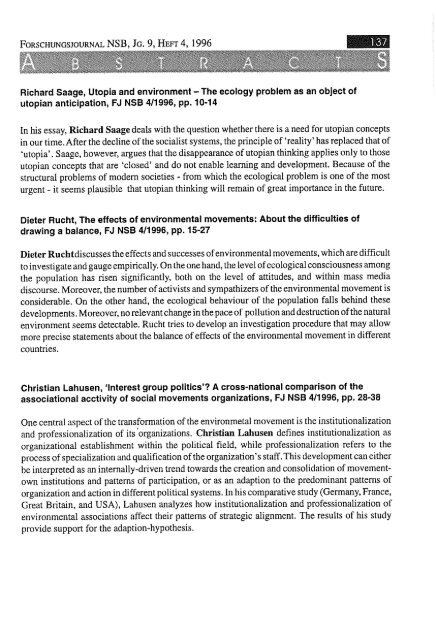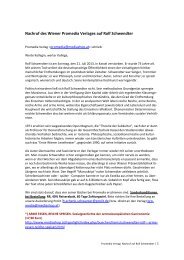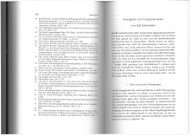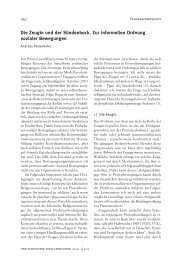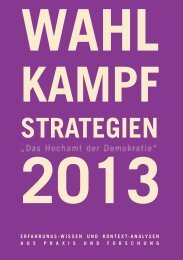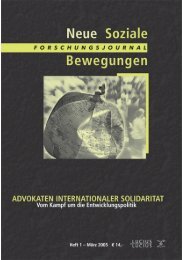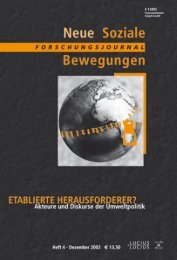Vollversion (6.59 MB) - Forschungsjournal Soziale Bewegungen
Vollversion (6.59 MB) - Forschungsjournal Soziale Bewegungen
Vollversion (6.59 MB) - Forschungsjournal Soziale Bewegungen
Erfolgreiche ePaper selbst erstellen
Machen Sie aus Ihren PDF Publikationen ein blätterbares Flipbook mit unserer einzigartigen Google optimierten e-Paper Software.
FORSCHUNGSJOURNAL NSB, JG. 9, HEFT 4, 1996<br />
Richard Saage, Utopia and environment - The ecology problem as an object of<br />
utopian anticipation, FJ NSB 4/1996, pp. 10-14<br />
In his essay, Richard Saage deals with the question whether there is a need for utopian concepts<br />
in our time. After the decline of the socialist Systems, the principle of 'reality' has replaced that of<br />
'utopia'. Saage, however, argues that the disappearance of utopian thinking applies only to those<br />
utopian concepts that are 'closed' and do not enable learning and development. Because of the<br />
structural problems of modern societies - from which the ecological problem is one of the most<br />
urgent - it seems plausible that utopian thinking will remain of great importance in the future.<br />
Dieter Rucht, The effects of environmental movements: About the difficulties of<br />
drawing a balance, FJ NSB 4/1996, pp. 15-27<br />
Dieter Ruchtdiscusses the effects and successes of environmental movements, which are difficult<br />
to investigate and gauge empirically. On the one hand, the level of ecological consciousness among<br />
the population has risen significantly, both on the level of attitudes, and within mass media<br />
discourse. Moreover, the number of activists and sympathizers of the environmental movement is<br />
considerable. On the other hand, the ecological behaviour of the population falls behind these<br />
developments. Moreover, no relevant change in the pace of pollution and destruction of the natural<br />
environment seems detectable. Rucht tries to develop an investigation procedure that may allow<br />
more precise Statements about the balance of effects of the environmental movement in different<br />
countries.<br />
Christian Lahusen, 'Interest group politics'? A cross-national comparison of the<br />
associational acctivity of social movements organizations, FJ NSB 4/1996, pp. 28-38<br />
One central aspect of the transformation of the environmetal movement is the institutionalization<br />
and professionalization of its organizations. Christian Lahusen defines institutionalization as<br />
organizational establishment within the political field, while professionalization refers to the<br />
process of specialization and qualification of the organization's staff. This development can either<br />
be interpreted as an internally-driven trend towards the creation and consolidation of movementown<br />
institutions and patterns of participation, or as an adaption to the predominant patterns of<br />
Organization and action in different political Systems. In his comparative study (Germany, France,<br />
Great Britain, and USA), Lahusen analyzes how institutionalization and professionalization of<br />
environmental associations affect their patterns of Strategie alignment. The results of his study<br />
provide support for the adaption-hypothesis.<br />
13/


